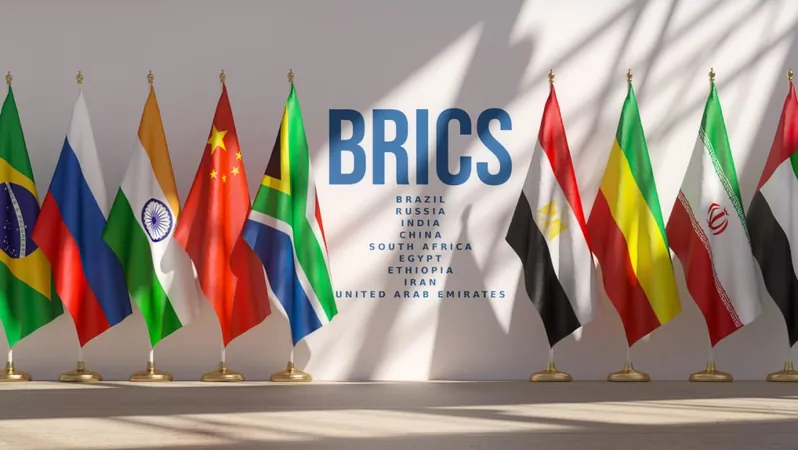
Indonesia's BRICS Membership: A Potential Economic Power Move or Risky Gamble Amid Trade Turbulence?
2025-01-10
Author: Nur
Indonesia's BRICS Membership: A Potential Economic Power Move or Risky Gamble Amid Trade Turbulence?
JAKARTA – This week, Indonesia achieved a noteworthy milestone in its foreign relations, officially joining BRICS, a group comprised of Brazil, Russia, India, China, and South Africa—nations that collectively wield significant influence in the global economy. Analysts have hailed this success as emblematic of President Prabowo Subianto’s commitment to an engaged and dynamic foreign policy.
Brazil, the current chair of BRICS, revealed Indonesia's unanimous acceptance during a meeting on January 6, following an agreement made at the 2023 BRICS Summit in Johannesburg, South Africa, which allowed for new members to join the bloc.
With a robust and stable economy, Indonesia is seen as an attractive addition. Teuku Rezasyah, an international relations lecturer at Padjadjaran University, emphasized its economic potential and what this membership could mean for Indonesia's international standing. He noted that "Indonesia's inclusion strengthens BRICS and positions the archipelago favorably on the global stage."
Despite the optimism surrounding Indonesia's membership, experts urge caution. They point to former President Donald Trump’s threats regarding BRICS, where he claimed he would impose punitive tariffs on member nations if they attempted to create a competing currency to the US dollar. In a post on his social media platform, Trump warned that countries considering such a move could face tariffs of up to 100 percent, jeopardizing their trade relationships with the US.
"Indonesia must be mindful of Trump's aggressive trade policies," cautioned Hikmahanto Juwana, a professor of international law at the University of Indonesia. "Should he view Indonesia as hostile due to its alignment with BRICS, it could jeopardize vital trade benefits that Indonesia has enjoyed with the US, valued at over $34.5 billion in 2023."
As Indonesia navigates its new role within BRICS, it remains committed to a free and active foreign policy, as underscored by Foreign Minister Sugiono. He stated that Indonesia would continue to pursue its interests while acting as a bridge between developing countries and the Indo-Pacific region.
Membership in BRICS does present challenges, particularly in maintaining Indonesia’s historical stance of non-alignment in global affairs. Analysts warn that aligning too closely with BRICS could place Indonesia in a precarious position with Western powers, especially amidst ongoing trade disputes regarding commodities such as palm oil and nickel.
To safeguard its trade relationships and avoid potential economic backlash, Indonesia's policymakers may need to adopt strategic engagements that clearly define Indonesia's position within the international arena, assuring partners of its commitment to free trade and economic cooperation.
As Indonesia embraces its new BRICS membership, international relations experts stress the importance of maintaining a balanced approach that fosters dialogue with both non-aligned and allied nations.
In conclusion, while Indonesia's membership in BRICS represents an exciting opportunity for increased economic collaboration and influence on the global stage, it is paired with significant challenges that require adept diplomatic maneuvering to navigate the complex web of international trade and relations. Will Indonesia strike the right balance, or is it stepping into a turbulent trade environment? Only time will tell!





 Brasil (PT)
Brasil (PT)
 Canada (EN)
Canada (EN)
 Chile (ES)
Chile (ES)
 Česko (CS)
Česko (CS)
 대한민국 (KO)
대한민국 (KO)
 España (ES)
España (ES)
 France (FR)
France (FR)
 Hong Kong (EN)
Hong Kong (EN)
 Italia (IT)
Italia (IT)
 日本 (JA)
日本 (JA)
 Magyarország (HU)
Magyarország (HU)
 Norge (NO)
Norge (NO)
 Polska (PL)
Polska (PL)
 Schweiz (DE)
Schweiz (DE)
 Singapore (EN)
Singapore (EN)
 Sverige (SV)
Sverige (SV)
 Suomi (FI)
Suomi (FI)
 Türkiye (TR)
Türkiye (TR)
 الإمارات العربية المتحدة (AR)
الإمارات العربية المتحدة (AR)